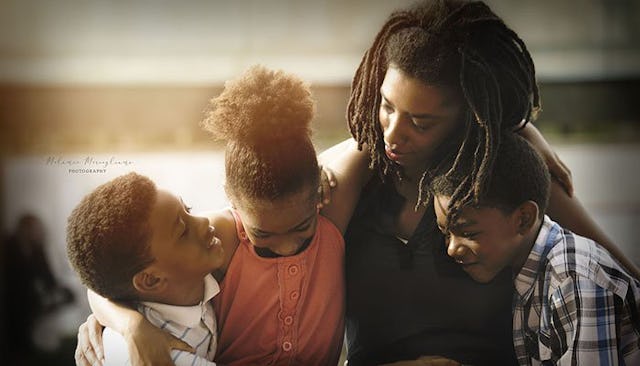This Is What Being A Mom To A Black Child In 2016 Is Like

“They were born with the one thing that some consider a crime… black skin”
Shakirah Milford and her husband Jeremy Milford live in a suburb right outside of Atlanta, Georgia. Their children are Sophia, 9, Elijah, 6 and Christian, 5. I interviewed Shakirah about the racism she and her family faces on a daily basis: the blatant and the subtle. I asked her about her fears as a wife of a black man and the mother of black sons in 2016. I asked her about police brutality.
The innocence of childhood is being destroyed in American families. Our children, and yes, they’re all of our children right now, are suffering in ways we have yet to see the fullest extent of. They are vulnerable — and we can’t protect them from the realities of the world in which we live. Shakirah doesn’t know how her son heard about cops killing black boys or men: it could be radio, TV, overheard adult conversations, or even friends at school. It doesn’t matter where he heard it – it’s that this is his reality. A six-year-old should be talking about their favorite television shows, the crafts they did at school, and what happened at the playground — not being afraid to exist as a black child.
Shakirah and her family let myself and Atlanta-based photographer Melanie Mercogliano into their private lives for our project Dispatches From The Front Lines of Black Motherhood: Real Injustice, Deep Fears, And Unwavering Hope.
These are her words. Her stories are excerpted here for Scary Mommy.
Christian, 5. Courtesy Melanie Mercogliano Photography
“My son entered preschool and he was being teased by his friends because of his afro. This made his confidence decrease and that made me hurt for my son. My husband and I talked to him about his hair being great, but eventually we had to talk to his teachers about the situation. He was also told by two of his classmates that he couldn’t come to their house because he had brown skin.
“I told him that his brown skin is beautiful and if someone does not accept you for who you are then you don’t need to be friends or go over to their home.”
“I feel like people will not see my sons as innocent as little white boys. If they misbehave it will be perceived as them being awful instead of just being little boys who are learning.
“I’ve definitely seen it in the school system as well. For example, a little white child will misbehave in a class and a teacher will put him in timeout whereas a little black boy would do the same thing, but he would be sent to the principal’s office. It is unspoken/unrecognized racism. It pisses me off that my son can’t just be a kid, because in my eyes, all kids are innocent.”
Christian and Elsa, 2. Courtesy Melanie Mercogliano Photography
“I’m raising young black boys that will grow into black men. They are taught to be respectful and make right choices, but as we have seen recently sometimes that doesn’t even matter.
“They were born with the one thing that some consider a crime, which is black skin. Every time a cop drives by he says ‘Mommy I don’t want to be killed.’
“It literally breaks my heart. I tell him not all cops are bad, not all whites are bad, not all blacks are bad, but there are bad people in the world and the good police will not harm you but keep you safe.”
Elijah and his dad, Jeremy. Courtesy Melanie Mercogliano Photography
“When I see police brutality and unarmed black men being shot it makes me angry, sad, depressed, and hopeless sometimes. I try not to think about it all the time, but when I look in my sons’ faces I have to think about it. I’m going to have to talk to my kids about racism and police brutality and to be honest I don’t know what I’m going to say.
“My husband will probably lead that conversation because I will be consumed with emotions and my children need to hear a clear message.”
Milford Family. Courtesy Melanie Mercogliano Photography
“My husband and I have friends from different cultural backgrounds. We talk to them about accepting differences because no one is the same and that’s what makes people special. I raise empathetic children by leading by example. I treat everyone the same.”
Sophia, 9. Courtesy Melanie Mercogliano Photography
“My oldest daughter is afraid of Donald Trump. She came home and told me that her and her Muslim friends are afraid that they are going to be sent back to another country. My husband and I spoke to her about racism because she can understand. ”
Milford Family. Courtesy Melanie Mercogliano Photography
“My dream for my children is for them to be happy being themselves without having to worry about changing because of the color of their skin. I want them to know that black skin is beautiful and that they are loved.”
A dream we share with you mama. The project Dispatches From The Front Lines of Black Motherhood: Real Injustice, Deep Fears, And Unwavering Hope aims to start difficult conversations surrounding racism in this country, spread awareness, and support families dealing with discrimination and injustice.
Many thanks to everyone who made this project possible, including Shakirah and the Milford family. Change can happen starting in our homes. Moms can lead the way.
Shakirah, Sophia, Elijah and Christian Milford with photographer Melanie Mercogliano and daughters Elsa, 2, Lucy, 5 and writer Sarah Hosseini with daughters Liliana, 6 and Aliah, 5.
This article was originally published on